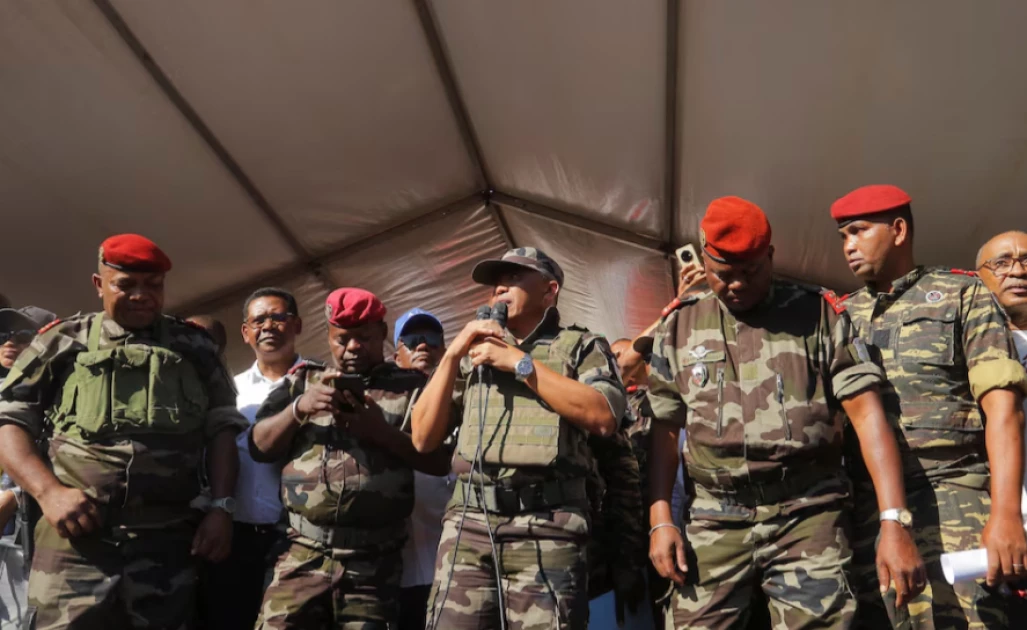Madagascar's military takes power, fleeing president impeached

Colonel Michael Randrianirina addresses protesters gathered outside the town hall on Independence Avenue during a nationwide youth-led demonstration against frequent power outages and water shortages, in Antananarivo, Madagascar, October 14, 2025. REUTERS/Zo Andrianjafy

Audio By Vocalize
An army commander who led a mutiny in Madagascar said on Tuesday
the military had taken power after President Andry Rajoelina was impeached by
lawmakers and forced to flee the country following weeks of youth-led
protests.
Rajoelina had refused to step down despite escalating Gen Z
demonstrations demanding his resignation and widespread defections in the army.
"We have taken the power," Colonel Michael
Randrianirina declared on national radio and said that the military was
dissolving all institutions except the lower house of parliament or National
Assembly.
Randrianirina later told reporters a committee led by the
military would rule the country for a period of up to two years alongside a
transitional government before organising new elections.
"The following institutions are suspended: the Senate,
the High Constitutional Court, the Independent National Electoral Commission,
the High Court of Justice, and the High Council for the Defense of Human Rights
and the Rule of Law," a statement from the country's military leaders
said.
In a day of turmoil for the nation off southern Africa's
coast, the 51-year-old leader, whose whereabouts are unknown, earlier sought to
dissolve the lower house by decree.
But lawmakers went ahead with a vote to impeach him, leaving
the country in a constitutional deadlock which the military seized upon to
declare they were taking charge.
Rajoelina, who himself came to power in a coup in 2009,
condemned the power grab by the military in a statement.
MILITARY SUSPENDS
INSTITUTIONS
Randrianirina, a commander in the elite CAPSAT army unit
that played a key role in Rajoelina's 2009 coup, broke ranks with him last
week.
In a defiant address to the nation on Monday night,
Rajoelina said that he had been forced to move to a safe place because of
threats to his life. An opposition official, a military source and a foreign
diplomat told Reuters he had fled the country on Sunday aboard a French
military plane.
His isolation increased further on Tuesday when even
lawmakers from his ruling coalition, which holds a parliamentary majority,
voted to impeach him on charges of engaging in activities deemed incompatible
with presidential duties.
Rajoelina had repeatedly warned in recent days that an
attempted coup was underway in the Indian Ocean island nation.
ESCALATING
DEMONSTRATIONS
Demonstrations first erupted in the country on September 25
over water and power shortages and quickly escalated into an uprising over
broader grievances, including corruption, bad governance and a lack of basic
services.
The anger mirrored recent protests against ruling elites
elsewhere, including Nepal and Morocco.
Earlier on Tuesday, at Antananarivo’s 13 May Square, along
the main drag lined with palm trees and French colonial buildings, thousands of
protesters danced, marched, sang and waved banners denouncing Rajoelina as a
French stooge because of his dual citizenship and support from Madagascar's
former coloniser.
Many were waving Malagasy flags and the signature Gen Z
protest banner of a skull and crossbones from the Japanese "One
Piece" anime series.
At one point, Randrianirina took the stage and asked:
"Are you ready to accept a military takeover?", drawing cheers of
approval from the crowd.
Later, as news of the military takeover filtered through to
protesters, many were jubilant.
"We’re so happy Andry Rajoelina is finally gone ... We
will start again," high-school student Fih Nomensanahary said, with four
of her friends cheering alongside her.
Others were more cautious. "They need to hand over to a
civilian administration quickly and have an election," said Rezafy Lova, a
68-year-old IT consultant.
CAPSAT had joined the protesters over the weekend, saying it
would refuse to fire on them. It went on to take charge of the military and
appointed a new army chief, prompting Rajoelina to warn on Sunday of
an illegal attempt to seize power.
Since then, the paramilitary gendarmerie and the police have
also broken ranks with Rajoelina.
Madagascar, where the average age is less than 20, has a
population of about 30 million, three-quarters of whom live in poverty. Between
its independence in 1960 and 2020, GDP per capita plunged 45%, according to the
World Bank.


Leave a Comment